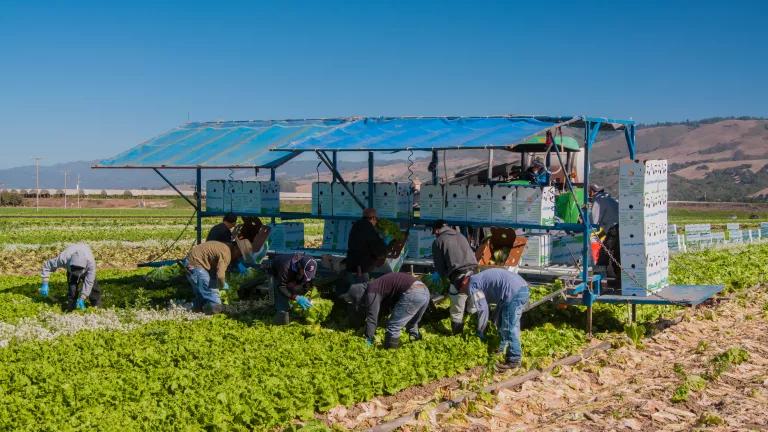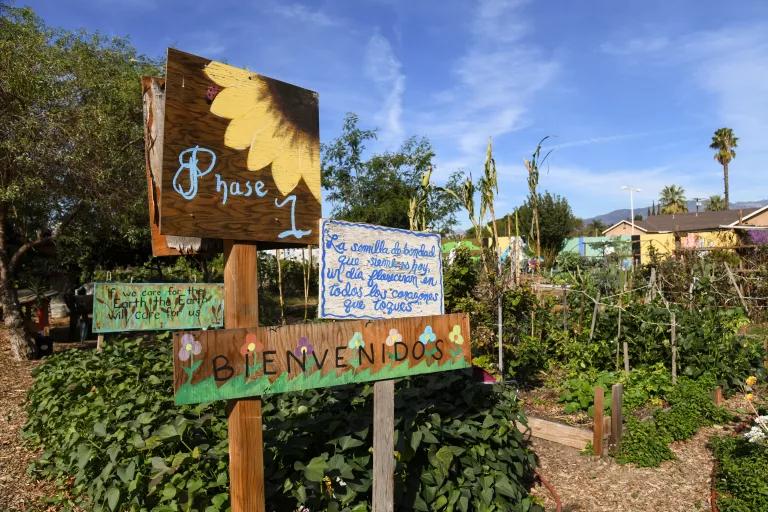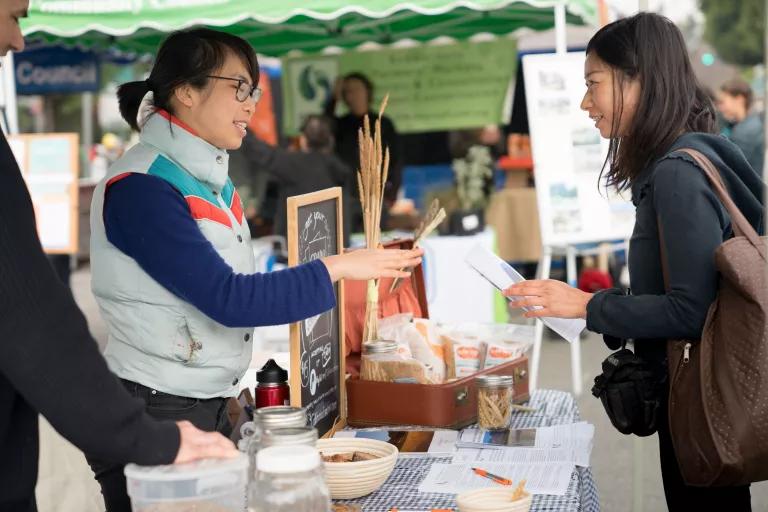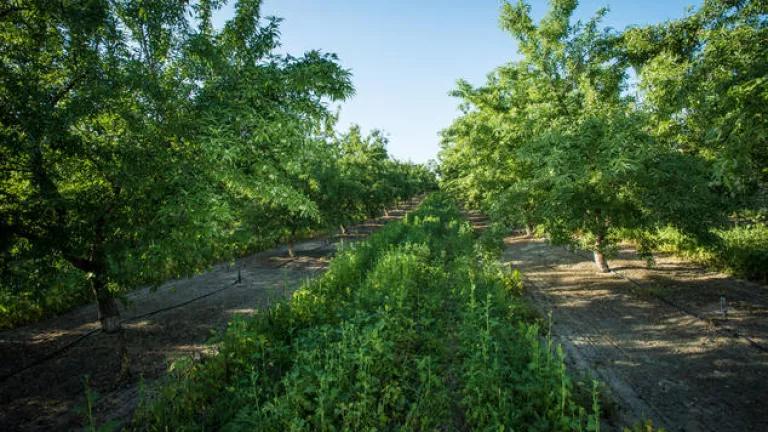Chance for a More Resilient and Equitable Food System in CA
With AB 125, California has an opportunity to reshape our food and farming system to help protect workers in fields, kitchens, and grocery stores while providing our most vulnerable communities improved access to healthy, sustainably produced food.

Migrant workers harvest Lettuce at Lakeside Organic Gardens in Watsonville, CA on Tuesday, Aug. 27, 2013.
California’s food and farming system has been tested in unprecedented ways this past year, due in large part to both the COVID-19 pandemic and climate change. The pandemic exposed the multitude of risks faced by essential workers that we depend on to feed us, the food insecurity that has left millions of Californians—including in Tribal communities—unable to access the nourishment they need, and the rigidity of our infrastructure that couldn’t keep up with changing market demands and consumer preferences. The magnitude of these vulnerabilities must be answered with comprehensive solutions that address the interconnected needs of our food system. Furthermore, these solutions must center equity in order to begin to reverse historic discrimination patterns.
Assembly Member Robert Rivas has taken on this challenge with AB 125, The Equitable Economic Recovery, Healthy Food Access, Climate Resilient Farms & Worker Protection Bond Act, introduced on March 16th. This bond, supported by a diverse coalition of groups including NRDC, will invest around $3 billion over five years to accelerate California’s economic recovery while helping the state overcome food system inequities, protect workers, transition to more organic and climate resilient farming practices, create and restore jobs, and increase food security through a variety of different interventions. Most importantly, the multitude of programs in this bond are designed to ensure that significant resources—at least 40 percent—are allocated to projects in low-income communities and for programs that support farmers and ranchers who have been historically left out of publicly funded agriculture programs.
This food and farming bond act will:
Provide Essential Support for our Essential Farmworkers
During the pandemic, farmworkers and food chain essential workers risked their health by working in fields, and after work, they returned to overcrowded living conditions that spread the COVID-19 virus. Farmworkers were also forced back into work conditions without the guarantee of personal protective equipment. This is unacceptable. We need to provide for the people who provide for us. That’s why nearly $650M in this bond is allocated to support farmworker health and well-being. The bond provides critical investments in affordable, community-based housing, safe and affordable drinking water infrastructure, and personal protective equipment that keep workers safer during COVID and wildfires. Other provisions include funding to upgrade indoor air quality in existing farmworker housing and better connecting farmworker housing with services.
Unleash the Power of Sustainable Agriculture
California’s farmers and ranchers can help the agriculture sector become a climate solution if we increase public investment that catalyzes transition to organic, regenerative, and diversified farming practices. AB 125 will invest about $1.14 billion in a diverse array of programs that help producers shift away from synthetic pesticides and fertilizers, protect and nourish soil, use our precious water resources more efficiently, and protect biodiversity. These solutions will increase climate resiliency and adaptation, and also result in a healthier food system for farmers, farmworkers, and communities through the state.

Phase One area of Huerta del Valle (HdV), a 4-acre organic Community Supported Garden and Farm in Ontario, CA. Taken Nov. 13, 2018.
USDA Photo by Lance Cheung.
Bring Healthy Food within Reach
Vulnerable populations of all ages, especially youth and seniors throughout California and in Tribal communities, too often lack access to healthy, nourishing meals on a daily basis. This bond will invest in $750 million to restore and expand aging school kitchens, shore up our state’s emergency food programs, expand urban agriculture and community gardens, make it easier for low-income eaters to buy farm-fresh food, and ensure that vital programs like Food as Medicine and senior nutrition have the necessary infrastructure to thrive. All of these programs will be designed to ensure greater access to healthier, and more sustainably grown food, including California-produced organic.

California Center for Cooperative Development (CCCD) Cooperative Development Associate Mai Nguyen is ready to talk with people about the importance of local grains from this Torrance, CA, farmers market, on Jan. 15, 2017.
Strengthen Regional Food Systems
From public health pandemics to wildfires to drought—or several at the same time as was the case last summer—California needs to take this opportunity to rebuild stronger and more reliable regional food supply chains. Investing in more diverse food systems infrastructure will boost community food security and economic stability. That is why $600 million in this bond is intended for the development of regional food hubs, meat and other processing facilities, and small-scale commercial fishing infrastructure. These new businesses will be supported by workforce training, safety and other technical assistance programs.
This bond is a historic opportunity for California voters to build and revamp the critical infrastructure needed to provide our state and Tribal communities with a safe, reliable, healthy, and environmentally sustainable food supply. With AB 125, California has an opportunity to reshape our food and farming system to meet 21st century realities. It will help protect workers in fields, kitchens and grocery stores while providing our most vulnerable communities improved access to healthy, sustainably produced food. As we move out of the pandemic, this bill will build resilience into how we grow and distribute food, making us better able to withstand whatever stressor comes our way.





